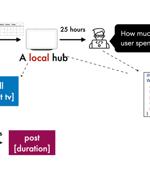Security News

More than two years after England launched a COVID data store, keeping details of National Health Service patients, the country's National Data Guardian remains unsatisfied with who is accessing the data. The COVID-19 data store was launched in March 2020, and would pull together medical and operational data about the spread of the virus across the country.

A newly designed privacy-sensitive architecture aims to enable developers to create smart home apps in a manner that addresses data sharing concerns and puts users in control over their personal information. Peekaboo operates on the principle of data minimization, which refers to the practice of limiting data collection to only what is required to fulfill a specific purpose.

Apple touts Passkey, its new privacy feature, at WWDC 2022. During its WWDC, Apple introduced the next version of macOS, codenamed Ventura, which includes a new privacy feature called Passkey, a digital key designed to help protect users from hackers by completely replacing a user's passwords.

European privacy campaigner Max Schrems is warning that enhancements to the EU-US Privacy Shield data-sharing arrangements might face a legal challenge if negotiators don't take a new approach. In 2020, the European Court of Justice struck down the so-called Privacy Shield after Schrems successfully argued it gave US government agencies access to EU citizens' personal data without commensurate protection.

The smart home has been much hyped for what feels a very long-time, but I think it is fair to say that the smart home era is now truly upon us. This status has been almost entirely driven by the rise of the smart speaker - the first truly mass-market smart home device.

Proposed Europe regulations that purport to curb child abuse by imposing mass surveillance would be a "Disaster" for digital privacy and strong encryption, say cybersecurity experts. A number of options have been put forward for lawmakers to mull that aim to encourage or ensure online service providers and messaging apps tackle the "Detection, removal, and reporting of previously-known and new child sexual abuse material and grooming."

There's one nation where outrage about Pegasus has been constant for nearly a year and shows little sign of abating: India. A quick recap: Pegasus was created by Israeli outfit NSO Group, which marketed the product as "Preventing crime and terror acts" and promised it would only sell the software to governments it had vetted, and for approved purposes like taking down terrorists or targeting criminals who abuse children.

How to manage your Alexa voice recordings and privacy. Perhaps you'd like to review those conversations to find mistakes that Alexa has made, rate the accuracy of Alexa's responses or remove any recordings that may be sensitive.

Mozilla privacy survey finds mental health and prayer apps fail privacy test pretty spectacularly. Apps with the most sensitive data seem to be the worst at protecting user privacy, according to a review by Mozilla's Privacy Not Included team.

According to the research paper by Trinity College Dublin computer science professor Douglas Leith, the company had been gathering far too much user data from core messaging apps, and the forensic analysis of the network flow extracted a well-deserved mea culpa from Mountain View. The complexity of this system is matched by the lack of transparency over how it works, much as the charming simplicity of using Alexa - you just gab at it - hides how it works.